SUPPLY CHAIN MANAGEMENT
The enormous losses of fruits and vegetables produced in the country are mainly because of the lack of proper infrastructure for storage and transportation under controlled conditions. Of late, Supply Chain Management (SCM) is gaining importance due to globalization. A supply chain is a set of three or more organizations linked directly by one or more of the upstream or downstream flows of products, services, finances, and information from a source to a customer. Supply chain management, then, endorses a supply chain orientation, and involves proactively managing the two-way movement and co-ordination of goods, services, information and funds (i.e. the various flows) from raw material through to end user. The changing lifestyle and open economy have forced the manufacturers/suppliers to produce/supply quality products.
Several factors are driving an emphasis on supply chain management. First, the cost and availability of information resources between entities in the supply chain allow easy linkages that eliminate time delays in the network. Second, the level of competition in both domestic and international markets requires organizations to be fast, agile, and flexible. Third, customer expectations and requirements are becoming much more stringent. So to satisfy the consumers, SCM system should operate with the two main objectives timeliness and quality.
The Supply Chain Umbrella
A large set of activities besides purchasing is part of supply chain management. Each of these seemingly diverse activities is part of a network that will define how efficiently and effectively goods and information flow across a supply chain. The activities include
i. Purchasing: Most organizations include purchasing as a major supply chain activity since purchasing is the central focus.
ii. Quality control: Almost all organizations recognize the importance of supplier quality and the need to prevent rather than simply detect quality problems. Progressive organizations work directly with suppliers to develop proper quality control procedures and processes.
iii. Demand and supply planning: Demand planning identifies forecasts of anticipated demand, inventory adjustments, orders taken but not filled and spare part and after-market requirements. Supply planning is the process of taking demand data and developing a supply, production, and logistics network capable of satisfying demand requirements.
iv. Material or inventory control: The material group is often responsible for determining the inventory level of finished goods required to support customer requirements, which emphasizes the physical distribution (i.e., outbound or downstream) side of the supply chain. The inventory control group is often responsible for determining the inventory level of finished goods required to support customer requirements, which emphasizes the physical distribution (i.e., outbound or downstream) side of the supply chain. v. Order processing: Order processing helps ensure that customer receive material when and where they require it. It represents a link between the producer and the external customer.
vi. Production planning, scheduling and control: Production planning, scheduling and control involve determining a time-phased schedule or production, developing short-term production schedules, and controlling work-in-process production. vii. Warehousing / distribution: Warehousing / distribution is particularly important for companies that produce according to a forecast in anticipation of future sales. viii. Customer service: Customer service includes a wide set of activities that attempt to keep a customer satisfied with a product or service.
TNAU & MSU in supply chain management
TamilNadu Agricultural University and Michigan State University, USA are engaged to address the emerging supply chain problems in fruits and vegetables through a scheme on “Building university capacity to improve fruit and vegetable supply chain development in India” funded by USAID through Association of Liason office, USA.
Objectives
The project aimed at improving Supply Chain Management (SCM) scenario of the country through
- Developing competency of faculty,
- Developing curriculum and learning opportunities and
- Strengthening partnership linkages among the stakeholders including farmers.
There were number of very positive unique aspects of the TNAU/MSU partnership which elevated the project beyond an exercise in value chain development of agri-food systems with explicit attention being paid not only to entire value chain but also to the bio-physical and socio-cultural environments in which there were to operate.
Success stories
i. Federation formed for the ‘King of fruits’
During one of the workshops arranged at TNAU under the HED/ALO project, an action plan was drawn based on the SWOC conducted amongst the various stake holders of mango in Tamil Nadu. It was derived that supply chain will be effective and efficient, only when farmers’ forums are formed as a vital step to go further. Accordingly, an apex body called the “Tamil Nadu Mango Growers’ Federation” (TAMAFED) was formed to deal with all issues regarding mango production. This facilitated better team work among the farmers so as to face the various challenges in supply chain management.
ii. Trading of mangoes goes online - a ‘One India-One Market concept’
Farmers in Krishnagiri are now getting fair prices for their mangoes. They are able to market their produce worldwide at the click of a mouse, thanks to the on line spot trading introduced by Safal National Exchange (SNX), for Tothapuri mangoes in Krishnagiri district.
SNX based in Bangalore and a joint venture between National Diary Development Board and Multi-commodity Exchange of India (MCX) is conducting on-the-spot electronic trading of mangoes in Krishnagiri and Pochampalli. Dharmapuri and Krishnagiri mango growers could sell around 2000 tonnes of fresh mangoes this year at a premium price.
iii. Tamil Nadu Growers go for EurepGAP certification
As a first step, Mr. Paul Ponnen, a progressive mango grower from Thalavadi and Mr. Sethupathy, mango grower at Palani, both belonging to the Tamil Nadu Mango growers federation, got their gardens (180 acres each) certified under EurepGAP certification.
Thereafter, Mr. Paul could export around 3 tonnes of fresh mangoes to the Gulf and Europe while Mr. Sethpathy is Planning to export his produce (150 t every year). He is also convincing his neighbours to go for certification so that they could pool their produce to reach the minimum requirement of 300 tonnes for export.
iv. A unique ‘Farmer owned Post-harvest Complex for banana’
The banana stake holders, both the grower and the trader, felt the need for establishing an infrastructure for better handling of their produce. In a banana workshop organized by the federation at Theni on 14th June 07, attended by the University officials, Agriculture Minister, Commissioner (Hort) and other government officials, ‘TamilNadu banana growers’ federation’ and ‘Theni banana growers’ and traders association’ represented to the government of TamilNadu to create a common facility for ripening and storage of banana in the form of a ‘ripening/storage chamber’, at Theni, a mojor banana growing belt of TamilNadu. This in turn would help to improve the quality of their produce (spotless fruits and even ripening) and improving the feasibility of broadening the distribution area of this commodity apart from increasing the keeping quality.
The Commissioner for Horticulture and Plantation Crops, Mr. Jag Mohan Raju put forth the request to the Agriculture minister, who then declared to provide such a chamber for banana to the tune of 450 tonnes capacity, worth Rs. 75 million rupees (1.87 million dollars) for Theni banana growers’ and traders association on partnership (Farmer / government) basis. This unique farmer owned post-harvest complex for banana will boost the trading of banana and take it to the new height. Based on the model designed for the ‘Post-harvest Complex for banana’ to be created for Theni district, two other programmes were contemplated for Coimbatore and Erode belts. This could be a step towards export marketing also.
v. “Farmer owned producer company” incorporated under Company Act and Wholesale Farmers’-Sandy
There are 10 cluster level Precision Farmers’ Associations and one Ltd. company in the name of ‘Dharmapuri Precision Farmers Agro Services Ltd.’ owned by 180 farmers as share holders. Apart from the technical empowerment, economic empowerment and social empowerment, this development is a commercial empowerment for the farmers, a farmer becoming CEO of a Limited Company. The firm is planning to establish a wholesale Mega Farmers Market on the four lane road and creates its own market for the produces.
vi. Establishment of Directorate of Agri-business Development at TNAU
The SWOC analysis, stakeholders meet and the interaction with Faculty has laid the foundation for the establishment of a new Directorate in TNAU as Directorate of Agri-Business Development. TNAU now responds to the needs of not only the farmers but all the partners in the supply chain. This is an indication that the project has helped to transform the University at policy level.
vii. Creation of Market Linkages
Several interactive meets were organized involving growers and big buyers such as Reliance, Maagritaa, Safal, Field fresh, Dole etc.
Accomplishments
Ms. Radha Singh, IAS, Agriculture Secretary, Govt. of India was invited to participate in an interactive meeting with the TamilNadu Mango and Banana Federations‘ office bearers as well as participants of “Tamil Nadu Precision Farming Project” on October 6, 2006 along with Mr. Surjit K. Choudary, Agriculture Secretary, Tamil Nadu and Dr. C. Ramasamy, Vice Chancellor, TNAU. Ms. Radha Singh IAS, Secretary agreed to place the demands put-forth by the federations to the Govt. of India for consideration. The demands included: 50% subsidy for drip irrigation, subsidy for liquid fertilizers to be used in drip irrigation, waiving of tax (cess) for transport of perishable commodities, a separate colour plate for the vehicles carrying perishables, special interest rates for loans availed from nationalized banks for agriculture/ horticulture.
Linkages
An ‘interactive meeting’ was organized involving officials from Field Fresh Foods Pvt. Ltd., DOLE Food Company and Tamil Nadu Banana Growers Association on 5th & 6th Dec ’06. During the discussion, the visiting delegates from Dole, Mr. Nicomedes “Nikko” S. Ylanan, Manager, QAP, Dole, Lanang, Davao City; Mr. Mayo Edwin C. Javier, Manager, Mango Business, VHT Facility and Mr. Augustine, Dole Stanfilco participated and visited some of the potential banana fields belonging to the federation members. Dole expressed willingness to help in the cultivation of 2000 acres of banana in Tamil Nadu.
Capacity building
A two days seminar on “Supply Chain Management and Food Safety Issues” was organized to disseminate knowledge gained in the project and the issues emerging out of SCM work in fruits and vegetables to the TNAU scientists. This was at HC & RI, Periyakulam on 10th and 11th September 2007 and was attended by 30 university scientists. There were lectures on certification and introduction to food industry, the definition of GAP, goals of GAP, benefits of EureGap certification, scope of the certification and compliance criteria, supply chain management in fruits and vegetables, experiences in mango cultivation and EurepGAP certification. There was also a visit to a EurepGAP certified garden at Palani called “Crystal Farms”.
The project made a great impact among the faculties of TNAU regarding the importance of SCM in fruits and vegetables, which paved a way to accept and to introduce a course on “Supply Chain Management’, for the undergraduate students of B.Tech (Horticulture).
Future
The federations with continuing help from TNAU are carrying forward the work of development and building of a modern supply chain for fruits and vegetables in the state of Tamil Nadu. Special effort is being made to involve and include small farmers, and develop more tie-ups with national and international markets and companies. To become stronger and sustainable, the federations are trying to generate their own resources through various means such as membership and the conduct of various activities such as workshops, fairs and training programs using the help of TNAU, aimed towards helping the farmers and other members of the supply chain to enhance quality, value and returns from their produce. These are supplemented by development funds from organizations such as the state and central government, banks, private companies, cooperatives, national and international NGOs, the World Bank and other development organizations.
Plates
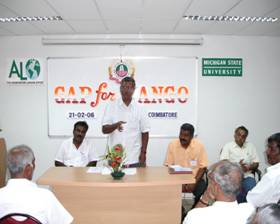
|
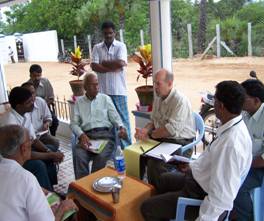
|
Launching of Mango federation |
Launching of banana federation |
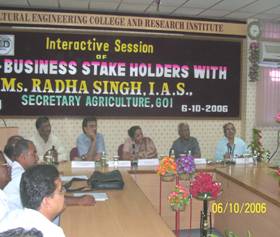
|
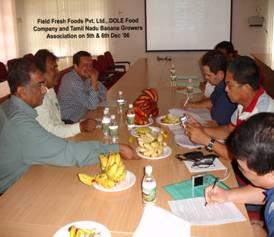
|
Interaction with Ms. Radha Singh, IAS |
Interaction with DOLE |
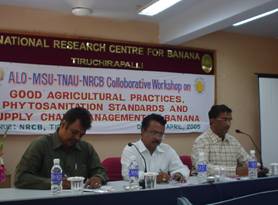
|
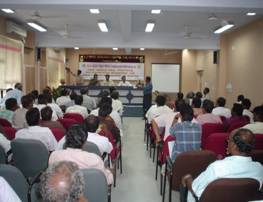
|
A workshop on “GAP, Sanitation and Phytosanitation Standards
and Supply Chain Management in banana”at NRCB, Trichy |
Acknowledgement: Dr. E. Vadivel and Dr. T.N. Balamohan
Horticulture College and Research Institute,
TamilNadu Agricultural University, Coimbatore – 641 003. |






